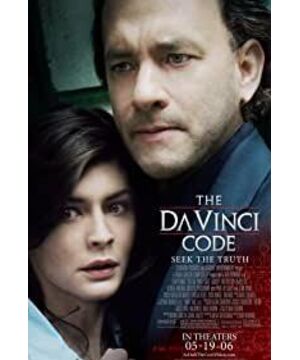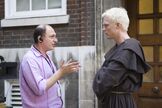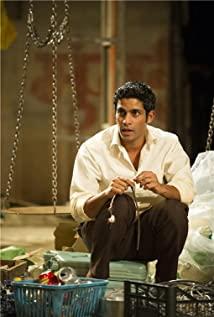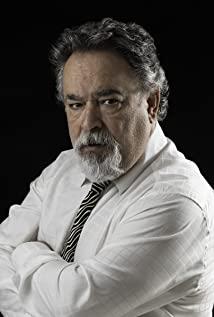Indeed, as I expected, the Da Vinci Code is a more mature and fascinating novel than angels and demons, but it may not be as suitable for adaptation into a movie as the former. What's more, in China, which is extremely lacking in religious background, it is understandable that half of the audience's reaction to get up and leave.
However, despite this, we can already see the efforts of Long Howard: He spent a lot of effort on how to use pictures to express some of the somewhat boring historical and theoretical passages in the book, which led to the lengthening of the time for the film to explain. He lost his energy in the intense plot promotion. In terms of visual processing, he has no shortage of magical touches, such as the overlapping of shots across history, and the processing of oil painting textures on the pictures of historical legends; for the theme of the original novel, Lang performed Hollywood The style is reduced to simplification, and I only asked the Tom Hanks version of Dr. Langdon: Jesus is a man and a god. Are there not enough people to die for this problem? ——The adaptation of the Da Vinci Code has reached the limit of this way of expression in movies. The sense of lens and rhythm of the novel itself is much worse than that of angels and demons. Therefore, the movie does this, at least It can't be regarded as a failed adaptation, although it is a little dull, and there is no lack of brilliance.
Of course, those who want to see visual excitement or the ups and downs of the plot may be slightly disappointed: in this aspect of creating a thrilling atmosphere, the film loses the spiritual thrill of the novel, and focuses on expressing this feeling on the screen. I remember the night I gnawed the original book all night, and when I saw how Dan Brown subversively explained The Last Supper, the hairs on my back were all erected-it was not a mystic horror from ghosts or death, but a face. When the history/common sense that I was accustomed to was completely overturned, at that moment, it came from the fear of weightlessness on the spiritual level. And this kind of fear, although only for a moment, is enough to surpass any terrifying world created by Stephen King. Until now, every time I look at the famous painting "The Last Supper", there is still a hint of profound chill. The film uses a more vivid slideshow to explain the various aspects of Jesus and the feminine Peter in the painting. After watching it, people will only make a "wow" exclamation, but there is no way to feel the words expounded. Horror.
In addition, in terms of guiding actors, Director Lang let "Gandalf" do all that a successful supporting role should do: gag a relaxed atmosphere in the first half, and guide the sharp turn of the plot in the second half. I want to thank Lang for not vulgarizing the chemistry between Tom Hanks and Audrey Tautou. In the end, the kiss that Tom printed on Audrey's forehead made my heart hang for a long time and finally let go: no matter how they look at it, it is really bad. Seniority, the puzzle-solving journey around Europe is really like a graduation trip with a teacher and students. . . . Although it is very good in acting. But speaking of the most dazzling acting skills, it belongs to the big villain Paul Bettany. He really belongs to the type that can't help other actors at all. No matter what kind of movie or role, he has a way to grab the show, that is, there is a way to firmly engrave the knife-like eyes in the minds of the audience, and there is a way to make everyone unable to play him. The male one in this film No. Tom is no exception (because in fact, apart from the childhood shadow of Dr. Langdon who fell into the well, apart from his academic background, he is a positive figure with no personality characteristics). And Silas, an albino killer, has a tragic past, has been redeemed, has masochistic behavior, and has fanatical beliefs. . . There is also albinism (%¥#%¥# Okay, when I didn’t say it), such a role is a perfect match for Bettany, and the director doesn’t need to talk about the play as it happens. Facts also proved that Silas was interpreted as, as he himself said: a tragic character with flesh and blood. The part of killing the nun, the part of self-abuse in the ascetic room, and the part of facing the bishop who was accidentally injured by him at the end, his eyes, his tears, every expression muscle on his face and the blood on his body , Every detail just happened to be brewed, mobilized, and then 100% played on the screen, allowing the audience to hold their breath under his blood-red eyelids. I have a complex with the two words penance. The Italian teacher has taught San Antonio of the Franciscans seriously. There are blood-stained angels living in the white Assisi. They once appeared in dreams, kneeling barefoot in the penance room. Flesh and bloody image of the back. So I am very happy that Bettany can play this monk who will cry and pray for his ghost under the sword. (Coughing, but in fact the monks who practice asceticism are not so terrible. Most of them grow vegetables in their gardens and spend their lives = =...)
The biggest gain from watching this movie is that it made me return to the mysterious and heavy topic of religious origins after I deviated from my interest for a long time. Dan Brown discusses the crisis of religious faith facing collapse in contemporary society in Angels and Demons, while the Da Vinci Code is about the entangled relationship between Catholics and pagans, or, in other words, a question about "I believe in the end. What is the ultimate question. This question cannot be answered in just over two hours of commercial film. (As a professional director, we can also see that Long Howard has no intention of answering this question seriously.) But if the film can lead the audience to think about this question mark, it can be considered as nothing in vain.
As for the ultimate question of Jesus’ humanity or divinity, I regret to find that I have a tendency to be heretics. Personally, I feel that Jesus Christ is a great man. But he is great enough to be the soul of a religion. Perhaps after being cleansed and beautified by history, he will be attached to many divinities by future generations. If placed in modern times, it would be the feeling of Mahatma Gandhi or Martin Luther King. I have no intention of demeaning and slandering Jesus by saying this. If Gandhi returned to Jerusalem a few centuries ago, he would definitely be worshipped by solid-eyed ancients. Why must we shed thousands of years of blood on the issue of humanity or divinity? Except for political rights, maybe the life of the ancients was boring and less fun, so it’s easier to be more real.||||. . . .
Regarding the ups and downs with the Vatican from the beginning of the filming to the release of the film, in fact, thinking about the ending of the novel, and from the standpoint of the church, I can understand why the bishops were so upset with Dan Brown. In a sense, the ending of the Finch Code is indeed a kind of Catholicism and its followers. . . If slander is not counted, at least it can be regarded as disrespectful banter. Nowadays, even saying that criticism of popular singers and idols will be criticized by fans, let alone such a serious Jesus Christ? So from the perspective of the onlooker, I also feel that Tom Hanks's "It's just a story" justification is quite lacking.
I have talked a lot about nonsense, but in fact I want to say that anyone who has a non-serious gossip interest in Catholicism or a serious research interest can use the Da Vinci Code to burn their interest, but devout believers must think twice. Then it went.
Believe that Jesus is God’s pure children, you must be mentally prepared before watching this movie.
View more about The Da Vinci Code reviews











